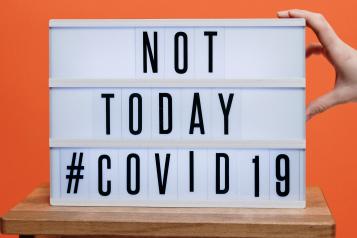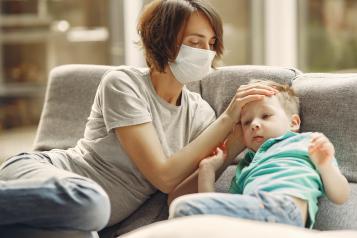Coronavirus: supporting parents and carers of children with SEND
Recent research shows that children and young people, including those originally considered to be clinically extremely vulnerable, are at very low risk of becoming seriously unwell from the virus.
It is important that your child continues to attend their school or other educational settings. A lack of schooling is known to have a significant negative impact on children, reducing their life chances and making physical and mental health issues worse. All early years providers, schools and colleges are continuing to put in place measures to help minimise the risk of spreading COVID-19. More information can be found at www.gov.uk/coronavirus/education-and-childcare
There is specific guidance for people aged 12 and over whose immune system means they are at higher risk of serious illness if they become infected with coronavirus (COVID-19). Immunosuppression means you have a weakened immune system due to a particular health condition or because you are on medication or treatment that is suppressing your immune system. People who are immunosuppressed, or have specific other medical conditions, have a reduced ability to fight infections and other diseases, including COVID-19. Most people in this group will be under the care of a hospital specialist. People in this group have been identified in one of 2 ways:
1. Eligibility for a third primary dose of the COVID-19 vaccine.
2. Eligibility for new treatments for COVID-19.
People eligible for a third dose of the COVID-19 vaccine
A third dose of the COVID-19 vaccine is being offered to people aged 12 and over who had a weakened immune system when they had their first 2 doses.
As of 29 November, the government accepted advice from the Joint Committee on Vaccination and Immunisation (JCVI) that people in the severely immunosuppressed group who have completed their primary course (3 doses) of COVID-19 vaccination will be due a booster (as a fourth dose) 3 months after administration of their third dose.
This includes people who had or may recently have had:
- a blood cancer (such as leukaemia or lymphoma)
- a weakened immune system due to a treatment (such as steroid medicine, biological therapy, chemotherapy or radiotherapy)
- an organ or bone marrow transplant
- a condition that means you have a very high risk of getting infections
- a condition or treatment your specialist advises makes you eligible for a third dose
JCVI has advised that household contacts of individuals who are immunosuppressed aged 5 to 11 are also now eligible for both doses of the Pfizer-BioNTech Comirnaty vaccine, with an 8-week dose interval.
People eligible for new treatments for covid-19
New treatments for COVID-19 are available through the NHS for people aged 12 and over who have tested positive for COVID-19 and are at highest risk of getting seriously ill in spite of being vaccinated.
This includes some people who have:
- Down’s syndrome
- a rare condition affecting the brain or nerves (including multiple sclerosis, motor neurone disease, Huntington’s disease or myasthenia gravis)
- sickle cell disease
- certain types of cancer
- HIV or AIDS
- a severe liver condition (such as cirrhosis)
- chronic kidney disease (CKD) stage 4 or 5
- had an organ transplant
- certain autoimmune or inflammatory conditions (such as rheumatoid arthritis or inflammatory bowel disease)
- a condition or treatment that makes you more likely to get infections
- had certain types of chemotherapy in the last 12 months
- had radiotherapy in the last 6 months
Most people in this group will receive a letter from the NHS nationally or from their care team confirming they might benefit from treatments and what steps to take. If you are in this group, a PCR test kit will be sent to your home, which you should keep in the event that you develop any COVID-19 symptoms. If you have not received your PCR kit by 10 January, you can contact 119 to order one.
Following a positive PCR test, most of these patients will be contacted by a local NHS coronavirus medicines team to assess whether they might benefit from treatments.
However, some patients may not be automatically contacted. This situation may arise if a patient has only very recently had a diagnosis or started treatment, particularly for cancer. It may also apply to some conditions where the NHS does not hold good information centrally. In this case, your specialist should contact you with further information about accessing treatments.
These treatments need to be given quickly after you start to feel unwell. They can help to stop you from getting seriously ill from COVID-19.
If you’re eligible for these treatments, have tested positive with a PCR test and are not contacted within 24 hours, you should contact your GP during opening hours or NHS 111 out of hours or at weekends.
Vaccinations for parents and carers
Read our COVID-19 Vaccinations FAQ page for more information on vaccinations
The Government has taken steps to ensure that unpaid carers can use a specific letter to identify themselves to gain priority for the booster jabs for COVID-19 along with paid care workers, if there are long queues. Carer support organisations are being asked to contact unpaid carers urgently within their organisation to ensure that they have a copy of the letter, if they need to use it. Carers UK is contacting their carer members today.
Do get in touch with your carer support organisation as they will have received a copy of this letter.
https://www.richmondcarers.org/
Vaccinations for children
The coronavirus (COVID-19) vaccines are safe and effective. 1st and 2nd doses are being offered to children aged 12 to 15 to give them the best protection against COVID-19.
This includes children who turn 12 on the date of vaccination.
Most children will be given their vaccine at school during school hours. They will be given 1 dose of the Pfizer/BioNTech vaccine.
As a parent or guardian you will get a letter or email with information about when the vaccine will be offered, and you'll be asked to give consent.
Third dose for severely immunosuppressed people over 12
Children with a weakened immune system are being offered a 3rd dose of a coronavirus (COVID-19) vaccine. This is also known as a 3rd primary dose.
If your child had a weakened immune system when they had their first 2 doses, the vaccine may not have given them as much protection as it can for people who do not have a weakened immune system.
A 3rd dose may help give them better protection.
The 3rd vaccine dose for people with a weakened immune system is different to a COVID-19 vaccine booster dose.
A 3rd dose of a COVID-19 vaccine is being offered to people aged 12 and over who had a weakened immune system when they had their first 2 doses.
Follow this link for more information
You can book you own or your child's vaccination online here or by calling 119
For local SEND updates and resources follow this link
If you have any questions about Coronavirus (COVID-19) that are related to education, the Department of Education have setup a dedicated helpline. Staff, parents and young people can call 0800 046 8687 or email DfE.coronavirushelpline@education.gov.uk from 8am to 6pm (Monday to Friday).


